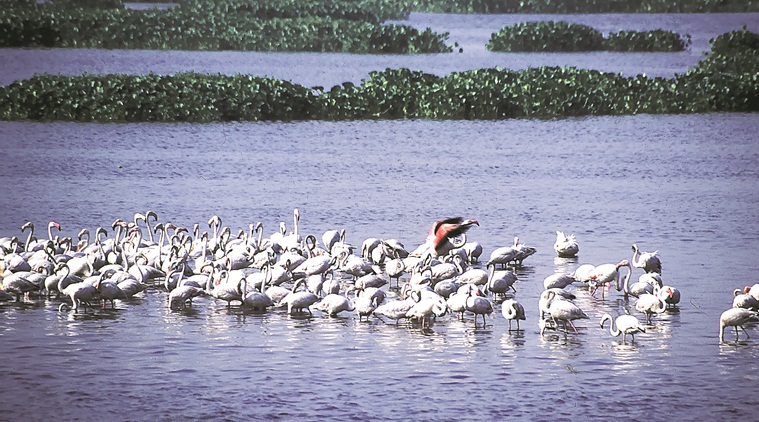- India
- International
Ballerina Birds: The flamingos can mess up your head
Flamingos wear these short pink ballerina tutus and stand straight, tall and effete, with all the regal hauteur of a brigadier-general on the parade ground, on pencil-slim legs that go on forever.
 Flamingos are highly strung and neurotic. Let an aircraft fly too low over the colony, and the birds will abandon nesting for the season
Flamingos are highly strung and neurotic. Let an aircraft fly too low over the colony, and the birds will abandon nesting for the season
“Where the heck are the damn birds?” I muttered, stepping uneasily on the squelchy mud-cracked earth and scanning the wide horizon. Sambhar Lake bed stretched vast and empty in all directions. What was galling was that the birds obviously had been here: the dark crazy-paved ground was strewn with tiny pink feathers that were being tugged this way and that by the brisk breeze. Then a pink shimmer on the horizon caught my eye: they were there — in their hundreds if not thousands — the flamingos.
The flamingos can really mess up your head. They wear these short pink ballerina tutus and stand straight, tall and effete, with all the regal hauteur of a brigadier-general on the parade ground, on pencil-slim legs that go on forever. Their slender necks are attractively curved, their eyes glare at you and they have beaks that look like boomerangs. They stalk about in muddy gook so ferociously saline it’ll peel the skin clean off your shins (their feet are webbed, their legs scaly and impervious). They subsist on (amongst other delights) that number one hit health food: spirulina. Of the six species found in the world, we have two in India — the greater (around 145 cm tall) and lesser (90 cm): the largest and smallest of the clan. Oh yes, and they eat with their beaks held upside down.
They’re generally found around saline mud flats and estuaries, sometimes surprisingly close to built-up areas in cities like Delhi and Mumbai. Of the two, the greater flamingo breeds in India on the Great Rann of Kutch, beginning in September. Many years ago, the late Dr Salim Ali was the first to discover the famous “Flamingo City” on the Rann, that hosts nearly half a million birds. A 30 cm high volcano-shaped mound of mud serves as the nest and usually, a single chalky white egg is laid. The baby, when hatched, immediately recognises its parents’ voices and is fed a rich blood-red algae soup. It’s a boarding-school bird really, because it leaves home in 10 or 12 days with other youngsters, marching across the flats behind adult “supervisors” who lead them to crèches located on islands, where they can find their own food. Gangs of off-white youngsters sometimes run amok and cause havoc in the nesting colony, upsetting incubating moms no end.
The lesser and greater flamingo have sorted out their dietary preferences perfectly so that they don’t compete directly with each other. The lesser flamingo, which floats its almost black bill upside down (like the hull of a boat) just beneath the surface of the water is happy scooping up the blue-green spirulina algae, rich in caretenoids which give it its crimson-pink colours. The greater flamingo delves deeper, scooping up minute crustaceans, micro-organisms and tiny fish. Their bills act like filters, the tongue working like a piston, sucking in and expelling water (20 times a second), the lamellae (or filtration plates) netting the food matter.
Before settling down, of course, hearts have to be won and the breeding displays of flamingos are no less astonishing. A battalion of dudes and dudettes will stand to attention, necks extended to the maximum, march across the plain, turning their heads right and left and flicking open and shut their wings smartly (this is actually called the “wing salute”!). Then they’ll preen and bow and open their wings again to show off their striking colours. A group of birds may suddenly lower their heads (into the shape of a shepherd’s crock) and run through the battalion, gabbling. This is called hooking. The lesser flamingo does it slightly differently: a group of a dozen or so birds will line up, the head of one resting on the back of the one ahead of it and the entire group will charge through the battalion (like American footballers — cross-dressed as ballerinas though) More and more birds join the group as they charge through the colony, wagging their heads from side to side. A wacko and crazy way of checking each other out and finding the right one for you? Well, it works because flamingo marriages last forever!

The trouble with flamingos is that they’re extremely highly strung and sensitive, neurotic even. Let an adjutant, or black-necked stork, pace the edge of a potential nesting colony, let a hyena or jackal lope towards them, let an aircraft fly too low over the colony and the birds will abandon nesting en masse for the season, leaving eggs to bake in the heat and chicks to starve. Even in their gabbling thousands, they need peace of mind for their babies. In this day and age, it’s a marvel that they are able to breed at all.
To encourage them, what have we gone and done and are planning to do in the Great Rann of Kutch — the only place in the country where the greater flamingo breeds? We have strung live high-tension electric cables across their flight paths, sizzling alive hundreds of birds, and have given the go-ahead for a major road-building project right through the Kutch Wildlife Sanctuary, so that tourist buses can clatter up and down and blare their klaxons as they pass through. It’s like inviting a drunken barati brass band into an ICCU and letting them go berserk.
And, instead of tiny pink feathers being tugged this way and that by the breeze, there’ll be thousands of empty gutka and chips packets being blown across the vast empty flats of the Rann. (What a) way to go!
Ranjit Lal is an author, environmentalist and birdwatcher
Apr 24: Latest News
- 01
- 02
- 03
- 04
- 05



































